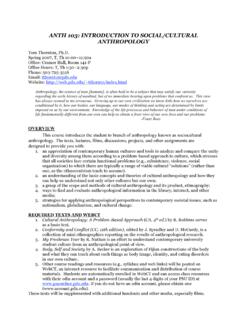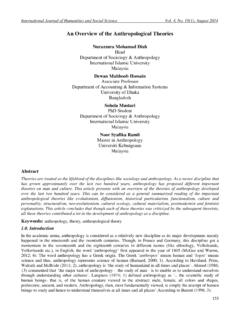Transcription of Department of Anthropology ANTH 1025F-001 …
1 Page 1 of 7 Department of Anthropology ANTH 1025F-001 introduction to sociocultural Anthropology course outline fall 2016 Prerequisite: none. Antirequisite: Anthropology 1020E. You cannot receive credit for taking both courses since they cover similar material. 3 lecture hours, course Classes: Wednesdays 3:30 pm - 6:30 pm Location: Biological and Geological Science Building (B&GS-0153) Instructor: Dr. Randa Farah Office: SSC 3423 Office hours: Wednesdays 1:00 pm - 3:00 pm Email: Teaching Assistants: Name: Hana Shams Ahmed Name: Rashedul Alam Office: SSC 3303 Office: SSC 3308 Office hours: Thursdays 10:00-12:00 Office hours: Tuesdays 11:00-1:00 Email: Email: course Description Why do we think other cultures are exotic and alien, or worse 'backward' and underdeveloped?
2 Why do we believe that "our" values, beliefs and cultural practices are superior or more 'civilized' than others? This course aims to make us re-examine and question what we regard as familiar and natural, while simultaneously viewing what seem odd and strange cultural practices and beliefs as familiar, understandable and historical. Despite the diversity we see in human societies and cultural configurations, what unites us as humans is stronger and more enduring. Page 2 of 7 course Materials Cultural Anthropology : A Problem-Based Approach.. Third Canadian Edition. Richard Robbins, Maggie Cummings, Karen McGarry, Sherrie Larkin, Nelson, Education Ltd. The book is available at Western's bookstore. Options: A print copy at the bookstore, or you can go online and purchase an EBOOK (cheaper) and/or E CHAPTERs via See Additional articles or sources might be posted on the website or distributed in class.
3 Learning Outcomes: At the end of the course students will learn to: Describe what anthropologists do and how they go about it. Explain how societies are interconnected, and why /how they transform over time. Examine changing social relations and cultural practices as inseparable from the political and economic realms. Render familiar cultural practices/beliefs as strange, and the alien or foreign as familiar. Analyze the underlying causes of social schisms, inequalities and hierarchies, racism, stereotyping, etc. and how dominant state institutions attempt to forge collective identities despite these inequalities. Interpret globalization as processes and examine their effects in the context of a world order based on the nation-state.
4 Examine causes of violence and its meanings in different contexts and societies. You are required to read this syllabus carefully, please do not ask your TAs or your instructor questions already answered here. WEEKLY SCHEDULE WEEK 1 Sept 14 introduction to the course Library presentation: Kristin Hoffman WEEK 2 Sept 21 Read: Chapter 1: Culture and Meaning WEEK 3 Sept 28 Read: Chapter 2: Doing Fieldwork in sociocultural Anthropology WEEK 4 Oct 5 Read: Chapter 3: The Meaning of Progress and Development Short quiz - 1 hour Page 3 of 7 WEEK 5 Oct 12 Read: Chapter 4: Constructing Realities WEEK 6 Oct 19 Read: Chapter 5: Constructing Families and Social Relationships WEEK 7 Oct 26 Midterm exam.
5 2 hours WEEK 8 Nov 2 Read: Chapter 6: Constructing Identities Essay Proposal due today WEEK 9 Nov 9 Read: Chapter 7: Social Hierarchies WEEK 10 Nov 16 No class today, you will have an out-of-class assignment Read: Chapter 8 Globalization, Neoliberalism, and the Nation-State pp. 198-226 WEEK 11 Nov 23 (cont'd) Read: Chapter 8: Globalization, Neoliberalism, and the Nation-State WEEK 12 Nov 30 Read: Chapter 9 Resolving Conflict WEEK 13 Dec 7 Essay due today Review Final Exam will be assigned between Dec 10 and Dec 21. Classes are interactive, they include lectures, discussions, and documentary films. Evaluation Date_____Weight/Percentage_ Short Quiz Oct 5 10% Midterm Exam Oct 26 20% Essay Proposal and References Nov 2 5% Out-of-class assignment Nov 16 5% Essay Dec 7 30% Final Exam TBA 30% Page 4 of 7 DETAILS 1.
6 Attendance!! Only brief lecture outlines will be posted on the website, thus attendance is critical. It is important that you attend every class. You are expected to read the assigned material and engage in class discussions. If you miss more than 4 classes without a note from Academic Counseling justifying your absence 2% of your final course grade will be deducted, if you miss you miss 6 or more classes without the required note from the Academic Counseling Office, 6% of your final grade will be deducted. The instructor will reserve the right to give a bonus point (1% added to final course grade) for students who never miss class and regularly participate in discussions. 2. Short Quiz 10%: This covers all material covered from week 1 - week 4, including the chapter assigned for that week.
7 3. Essay Proposal 5%: Hand in a proposal (one page double-spaced) outlining topics/questions you are interested in researching and writing about for your essay. Include a minimum of four anthropological references you have reviewed by then and plan to use in your essay. The references should include Anthropology sources at least 2 books and 2 scholarly articles. 4. Out-of-class Assignment 5%: This involves you writing a paragraph of about 250 words online (Forum, course website on OWL). The assignment will be on the chapter you read for the week and a documentary film (will provide you with the url link to it the week before). 5. Essay 30% (see details on essay below): Write an essay (1500 - 2000 words) on a topic related to the themes covered in class.
8 You need to have a minimum of 6 Anthropology references (books and articles combined). Submission: Please note a hardcopy of your paper should be handed in class and on time. In addition, an electronic version should be submitted to Turnitin. 6. Midterm Exam 20%: 2 hour exam held in class. It covers week 1- 6 (chapters 1 - 6). The midterm includes questions from readings, lectures, documentary films and ideas discussed in class. The midterm format is a combination of multiple choice, true and false, definitions fill-in the blanks, short and/or long answers. 7. Final Exam 30%: Most questions will be from the weeks we have not covered in the midterm, although there will be some questions related to all chapters.
9 The exam format includes a combination of the following: multiple choice, true and false, fill in the blanks, definitions, and short/long answers. The date of the final exam will be determined by the registrar and will be scheduled between Dec 10-21. Essay Essay Details: Passing an essay is critical to pass the course . If you plagiarize the essay you will get a zero and risk failing the course and other disciplinary measures according to Western policies. Start to think about the essay and begin research earlier in the term! An essay is neither a summary of books, nor a descriptive paper; rather, it involves developing an argument. Analysis and arguments must be supported with scholarly references. If you are not sure about what topic to write about, review abstracts of articles, tables of content in books, review the themes covered in the course and textbook, or look at anthropological journals and Page 5 of 7 books for topics you are interested in and bring some ideas with you if you wish to consult with the teaching team.
10 Helpful links For citation and information on style guides, plagiarism and other, consult: The Western Writing Support Centre offers free one-on-one counselling sessions, online writing help, and workshops. See The teaching team will provide examples on citation and how to find sources at the beginning of the term. General information about your essay Number of words 1500 2000 (marks will be deducted if maximum number of words significantly exceed or fall short of the minimum). Number pages, double space, font 12 Times New Roman, no space between paragraphs! Students must use a minimum of 6 sources, with no less than 4 from anthropological sources. An essay is not a summary of readings, but an in-depth argument about a question or topic that you support drawing on scholarly sources.









